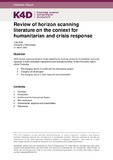| dc.contributor.author | Kelly, Luke | |
| dc.date.accessioned | 2020-04-21T14:45:01Z | |
| dc.date.available | 2020-04-21T14:45:01Z | |
| dc.date.issued | 2020-03-31 | |
| dc.identifier.citation | Kelly, L. (2020). Review of horizon scanning literature on the context for humanitarian and crisis response. K4D Helpdesk Report 772. Brighton, UK: Institute of Development Studies. | en |
| dc.identifier.uri | https://opendocs.ids.ac.uk/opendocs/handle/20.500.12413/15237 | |
| dc.description.abstract | This annotated bibliography has found a range of horizon scanning reports that identify climate change, a change in the global balance of power, and new technologies as some of the key drivers affecting the global context for humanitarian actors. Many reports identify increasing uncertainty in key systems, and the possibility of large, systemic crises. This report focuses on future-focused literature with direct or indirect implications for disaster response. It does not include reports that outline key trends in demography, climate or natural resources. Rather it focuses on reports that discuss the implications of these trends for humanitarian and disaster response, namely, discussions of the humanitarian system, climate change, demography, global governance, international relations and the likelihood of conflict, and new technology with the capability of harming civilians or improving humanitarian response. Some reports focused on current trends, levels or preparedness, or risks are included as they are likely to be valid for the next decade, even if they are not explicitly packaged as 'forecasts'. This K4D literature review includes both trend-based analyses, and more qualitative discussions of scenarios, points of change, and possible disruption. Many reports use more than one method. Many reports use experts to identify risks and trends, rank their importance, or discuss their implications and possible effects, usually taking a range of views from different disciplines. Most reports point to the possibility of 'unknown unknowns' of some variety. No attempt is made to assess the likelihood, or quality, of the forecast, beyond noting their evidence bases and type of analysis. | en |
| dc.language.iso | en | en |
| dc.publisher | IDS | en |
| dc.relation.ispartofseries | K4D Helpdesk Report;772 | |
| dc.rights.uri | https://www.nationalarchives.gov.uk/doc/open-government-licence/version/3/ | en |
| dc.subject | Aid | en |
| dc.subject | Development Policy | en |
| dc.subject | Governance | en |
| dc.title | Review of Horizon Scanning Literature on the Context for Humanitarian and Crisis Response | en |
| dc.type | Helpdesk | en |
| dc.rights.holder | © DFID - Crown copyright 2020 | en |
| dcterms.dateAccepted | 2020-03-31 | |
| rioxxterms.funder | Department for International Development, UK Government | en |
| rioxxterms.identifier.project | K4D | en |
| rioxxterms.version | VoR | en |
| rioxxterms.funder.project | 238a9fa4-fe4a-4380-996b-995f33607ba0 | en |

